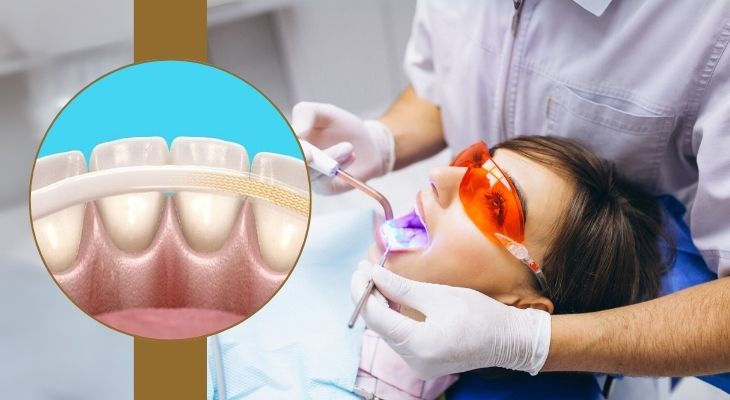
Teeth Splinting in Delhi: Strengthening and Securing Your Smile
Regain confidence in your smile with teeth splinting, a specialized procedure designed to reinforce and align weakened teeth. This advanced technique effectively restores strength and functionality while preventing further deterioration. By opting for this safe and efficient solution, you invest in your long-term oral health.
Enjoy the ability to eat, speak, and laugh freely, knowing that your teeth are securely stabilized with precision and care. At Veda Dentistry, we offer expert teeth splinting in Delhi, enabling you to cherish life's special moments with a healthy and confident smile.
Periodontal Splinting
Periodontal disease is a chronic infection that affects the gums and surrounding tissues, leading to inflammation and tooth instability. This condition is responsible for approximately 70% of adult tooth loss, affecting a vast majority of individuals at some stage in their lives. Common periodontal diseases include gingivitis and periodontitis.
One of the consequences of periodontal disease is increased tooth mobility. To stabilize loose teeth, they may be connected using a splint, typically composed of composite resin and a nylon mesh. This procedure effectively reduces movement and improves oral function.
Benefits of Teeth Splinting
Enhanced Stability – Strengthens loose teeth, preventing unwanted shifting or movement.
Improved Functionality – Restores the ability to chew and bite comfortably.
Increased Comfort – Reduces discomfort and sensitivity associated with mobile teeth.
Long-Term Protection – Helps prevent further damage or tooth loss, preserving the natural dentition.
Indications for Teeth Splinting
Tooth migration or drifting
Moderate to severe tooth mobility that cannot be treated with other methods
Stabilization of teeth affected by secondary occlusal trauma
Prevention of tipping or extrusion of unopposed teeth
Post-orthodontic stabilization
Post-trauma stabilization
Types of Teeth Splinting Treatments in India
Teeth may become loose due to factors such as bone loss, gum recession, trauma, and excessive biting forces. Various treatment options exist to stabilize teeth affected by periodontal disease, including:
1. Intracoronal Splinting
This semi-permanent procedure involves creating a channel within the teeth, into which a Kevlar-like ribbon or wire is placed. The channel is then sealed with composite filling material, securing the splint in place. Following the procedure, bite adjustments ensure equal force distribution across all teeth.
2. Extracoronal Splinting
A reversible method where weak teeth are bonded externally using composite filling material. For added support, a wire, metal plate, or ribbon may be incorporated. While less invasive, this technique is more prone to fractures and is generally used for short-term stabilization.
Treatment Options for Mobile Teeth
Gum Disease Management: Treating periodontal disease may reduce mobility, after which splinting can be considered.
Orthodontic Treatment: Once gum health is stabilized, orthodontic procedures can align the teeth properly.
Tooth Extraction and Replacement: This can be done using dental bridges, implants, or dentures, depending on the case.
Teeth Splinting: A minimally invasive and effective solution for stabilizing loose teeth, preserving natural structure.
Teeth Splinting Procedure
Different techniques are used for splinting, but the most recommended approach involves Ever Stick Perio, a bundle of pre-impregnated unidirectional glass fibers. This method allows for reliable splinting using minimally invasive techniques, offering a long-lasting and comfortable solution for patients with periodontal concerns.
The aesthetic glass fiber splint is discreetly placed behind the teeth and bonded using a resin that matches the natural tooth shade. This technique-sensitive procedure helps reposition mobile teeth, close gaps caused by shifting, and create a stable unit by connecting adjacent teeth. Additionally, if a tooth requires extraction in the future, the root can be removed while the natural crown remains within the splint, providing a seamless aesthetic result.
For treatment of teeth splinting in Delhi, consult Veda Dentistry and take the first step towards a stronger, healthier smile!
Frequently Asked Questions (FAQs)
1. Is teeth splinting a painful procedure?
No, it is a minimally invasive procedure, typically performed under local anesthesia to ensure comfort.
2. How long does teeth splinting last?
The duration depends on the technique used and how well oral hygiene is maintained. Intracoronal splints generally last longer than extracoronal ones.
3. Can I eat normally with a splint?
Yes, but it is advisable to avoid very hard or sticky foods to prevent damage to the splint.
4. Will splinting affect my oral hygiene routine?
Regular brushing and flossing are essential. Special care should be taken to clean around the splint.
5. How much does teeth splinting cost in Delhi?
The cost varies depending on factors such as the complexity of the case and materials used.
To know an accurate estimate of the cost of teeth splinting in Delhi, book an appointment with Veda Dentistry.


Book An Appointment